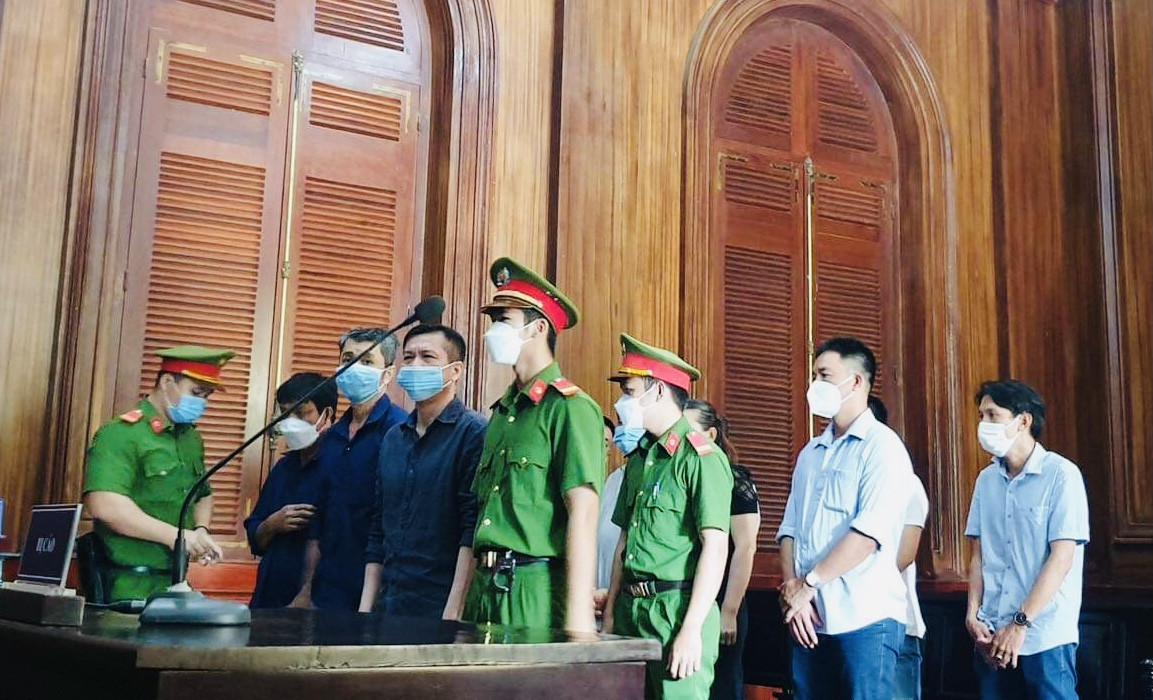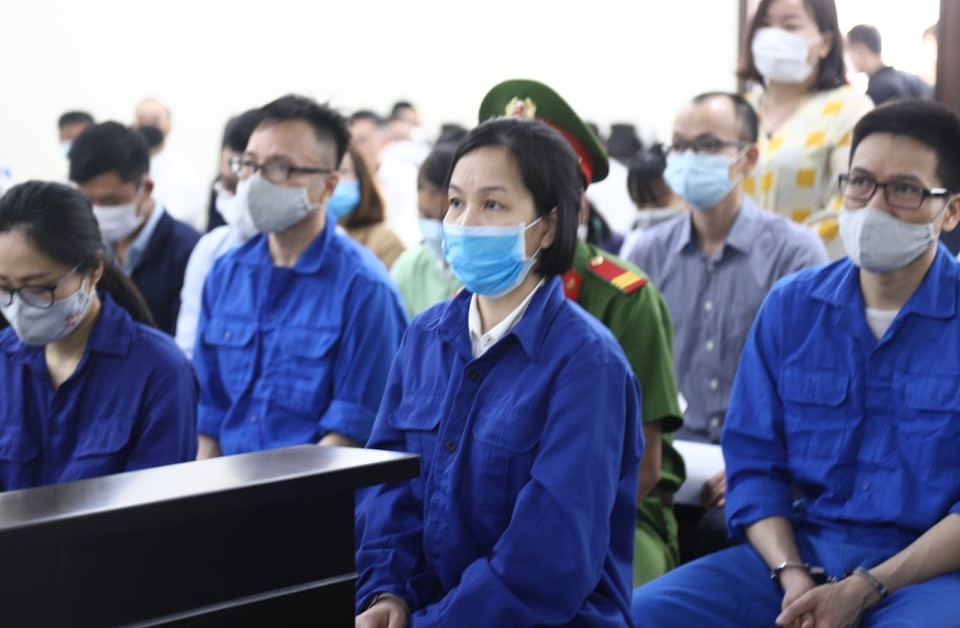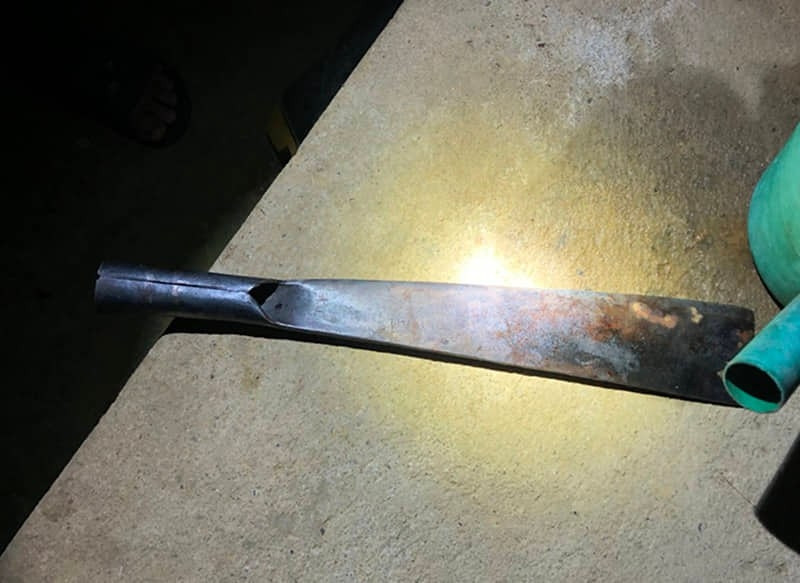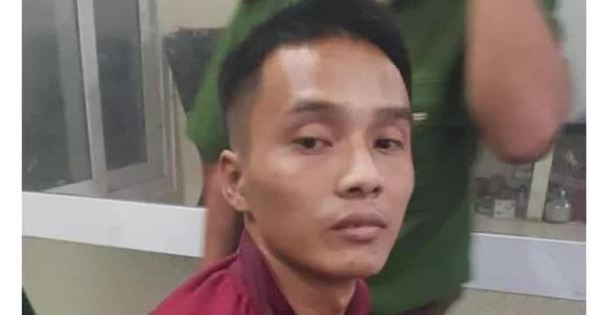Name 80 inspectors, traffic police but no evidence of bribes
The first instance court hearing the case of buying and selling thousands of vehicle logos of unknown origin and protecting overloaded vehicles received much attention from the public, especially the fact that the agency conducting the proceedings “reminded the name” of 80 inspectors. traffic (TTGT), traffic police (traffic police) of Dong Nai, Binh Duong, and Ho Chi Minh City.
There are brokers, giving bribes but can’t find the bribe recipients
According to the dossier, Nguyen Van Thoi and a number of accomplices testified from the beginning of 2014 to August 2015 that they gave bribes to 62 traffic policemen and 18 traffic officers at teams and stations in Ho Chi Minh City, Dong Nai and Binh Duong provinces. Nearly 4.2 billion dong is the amount paid for bribes.
During the trial, the People’s Court of Ho Chi Minh City summoned 83 individuals to attend the court as persons with related rights and obligations. However, only 3 people were present.
At the court, the trial panel held a confrontation between the defendants with 2 traffic policemen and the traffic police officer (who attended the court as a related person – PV). They simultaneously affirmed that they did not receive insurance money for overloaded cars. At the same time, defendant Thoi and a number of other defendants confessed that they did not know these two people.
As for the question of “attaching” to 80 traffic police and traffic police, the prosecutor’s representative emphasized that the investigating agency had organized the identification and recorded testimonies and the above 80 people did not admit to accepting bribes. Confrontation was conducted between the offender and 80 traffic police and traffic police, but the law agency could not clarify anything further.
Apart from the statements of the defendants, there is no other evidence to prove that these individuals have ever received protection money. Therefore, the agency conducting the proceedings did not have enough grounds to prosecute, investigate and handle 80 traffic police and traffic officers.
Based on the records and developments in court, the first-instance trial panel sentenced defendant Nguyen Van Thoi to 13 years in prison for the crime of “Giveaways”. Alleging the same crime, the first-instance court gave sentences ranging from 1 year, 8 months, 25 days in prison to 9 years in prison for 7 defendants who acted as accomplices. Committing the crime of “broking bribes”, defendant Nguyen Canh Chan (former traffic police officer of Dong Nai province police) received 7 years in prison.
Thus, those who commit the crimes of “Bribery”, “Bribery broker” have been punished as prescribed by the Penal Code.
However, public opinion does not seem to be satisfied when the case is “open” for the crime of “Receiving bribes”.

The first-instance court tried the defendants with acts of offering bribes and brokering bribes
The “confrontational” point of view?
Lasting from 2015 to now, the case has undergone many rounds of proceedings. Especially noteworthy is the period when the High People’s Court in Ho Chi Minh City announced the cancellation of the first-instance judgment.
Accordingly, in 2018, the People’s Court of Ho Chi Minh City had the first instance hearing of the case. The first instance court sentenced Nguyen Van Thoi to 14 years in prison, and Nguyen Canh Chan to 8 years in prison. The remaining defendants received from 1 year 8 months 24 days in prison to 10 years in prison. The first-instance judgment took effect, some defendants appealed because they wanted to enjoy suspended sentences.
In the 2019 appellate trial, the High People’s Court in Ho Chi Minh City canceled the first-instance judgment; request investigation, prosecution and retrial.
In the appellate judgment, the High People’s Court in Ho Chi Minh City said that the agency conducting the first-instance proceedings overlooked criminals and offenders. The indictment issued by the Supreme People’s Procuracy in 2018 named some people who received bribes with a specific amount and time of receiving bribes. However, all of the “receiving bribes” mentioned above are not criminally prosecuted.
In response, the investigating agency confirmed that the investigation conclusion clearly showed the names, working units, and the amount of money that the subjects gave bribes to the traffic police and the traffic police; rather than concluding that these officers engaged in bribery.
When canceling the first-instance judgment, the appellate level also found that the investigating agency held a sketchy and incomplete confrontation.
According to this level, the defendants provided names, positions, exact phone numbers and identification of some officers from traffic police units, traffic centers in Dong Nai, Binh Duong and Ho Chi Minh City. When officials do not admit to receiving bribes, the investigating agency will not fully conduct professional and investigation measures. Instead, the investigating agency concluded that there was not enough evidence to prove the act of accepting bribes.
The first-instance procedure-conducting agency shall clearly identify the bribe-giver, the bribe-giving amount, the bribe-broker, and the bribe-receiving amount; but does not indicate the recipient of the bribe. According to the appellate court, this angered the public.
Explaining the problem, the Police Department of the Ministry of Public Security said it was just a one-sided testimony from Thoi and his accomplices. The traffic police and traffic officers involved in the testimonies did not admit the act of receiving money. Due to the specificity of their work, the traffic police and the traffic police should publicize their personal phone numbers. This is a normal thing, industry rules do not have content that prohibits officials from disclosing personal phone numbers. The defendants who work in the transportation business should know the phone number of the traffic police, the traffic information is also normal… The investigative agency has no basis to investigate and verify the relationship between the violator, the logo seller and the judge. physical.
When recording testimonies as well as organizing confrontation, police agencies have audio-video recording (with sound); with the participation of representatives of the Supreme People’s Procuracy and the People’s Procuracy of Ho Chi Minh City (who sat in the prosecutor’s chair), defense lawyers.
The investigating agency commented that the appellate judgment contained one-sided comments, according to the subjective opinion of the judge.
Notably, the High People’s Court in Ho Chi Minh City disagreed with the view of handling traffic police and related traffic officers. Specifically, the Investment Police Agency agreed with the Inspector of the Ministry of Public Security in writing to propose the Department of Transport and the Police of Ho Chi Minh City, Dong Nai province and Binh Duong to take appropriate and appropriate disciplinary measures against the offenders. Officers help the criminal group ignore the offending vehicle. The Appellate Court held that such a view was unreasonable and did not reassure the people as well as the traffic police and traffic police.
4 individuals admitted to knowing Nguyen Van Thoi, including: Mr. Nguyen Tuan Anh, an officer of the District 8 Police Traffic Police Team; Mr. Nguyen Duc Toan, officer of the Saigon South Traffic Police Team; Mr. To Van Sy, former Vice Captain, Traffic Police Team of Cu Chi District Police; Mr. Nguyen Duy Khanh, former officer of Tan Tuc Traffic Police Station – Ho Chi Minh City Police. In particular, Mr. Khanh is hiding from the wanted after committing fraud to appropriate property.
According to the testimony, Mr. Tuan Anh and Thoi have known relationship since 2014. Several times, when Mr. Tuan Anh’s task force was patrolling the street, Thoi had a phone call asking to ignore the overloaded vehicle. Because of affection, Mr. Tuan Anh helped by ignoring some minor violations. In case of specific violations, he does not remember.
Like all officers working with the investigating agency in the case, Mr. Tuan Anh affirmed that he did not receive money. Or Mr. Nguyen Duc Toan explained that during his performance of the task, Thoi contacted him and asked him to protect the car with the logo, but Mr. Toan did not solve it and did not receive money.
Knowing Le Thi Cam Van (a co-conspirator with Thoi), Mr. Le Anh Duong, Deputy Captain of Traffic Police Team No. 1 – Dong Nai Provincial Police, said that Van raised the issue of protection, but he did not help, nor did he accept it. money.
Another subject testified that following Thoi’s instructions, he brought money to Mr. Pham Van Hung (Captain of the Cat Lai Traffic Police Team – Ho Chi Minh City Police) with the purpose of asking Mr. Hung to protect the overloaded vehicle with the logo. On the contrary, the captain of the Cat Lai Traffic Police Team denied the above testimony.
The remaining traffic police officers (Mr. Huynh Cong Thang, Vice Captain of An Lac Traffic Police Team; Mr. Le Van Hai, Deputy Captain of An Suong Traffic Police Team – Ho Chi Minh City Police…) all asserted that they did not know the subjects. All traffic police commit not to receive money to protect overloaded vehicles.
Not enough evidence to investigate (?)
Mr. Nguyen Minh Canh, inspector of the Department of Transport (Transportation) of Binh Duong province, admitted to knowing and drinking with Thoi a few times. Once, Mr. Canh helped Thoi by intervening in Binh Duong province’s traffic control working group to apologize for the violation. However, Mr. Canh did not accept the money. Similarly, Mr. Tran Thanh Son, an inspector of the HCM City Department of Transport, explained that he had helped Le Thi Cam Van (a co-conspirator with Thoi) to ignore the violation out of respect, but did not receive any money.
Through identification, Le Thi Cam Van recognized the photo of Mr. Phan Minh Hai (Deputy Team 7, Inspector of the City Department of Transport), an inspector of the HCM City Department of Transport. Van confessed that he had directly met Mr. Hai; The rest Van only exchanged by phone, handing over bribes to others.
Tran Trong Nhan, another accomplice of Thoi and Van, recognized the photo of Mr. Tran Trung Phuong, an officer of Team 8, Inspector of the HCMC Department of Transport. Nhan declared to help Van give him 15 million VND.
Like the traffic police, all traffic officers are committed not to engage in negative behavior to protect overloaded vehicles. The investigating agency concluded that the law did not have enough grounds to prosecute the acts of giving bribes to the above officials. However, the prosecution, investigation, prosecution and trial of the accused on charges of “Bribery” and “Bribery brokerage” is grounded.
In the period 2014-2015, Nguyen Van Thoi, Lai Thi Cam Van and accomplices colluded with a number of drivers and truck owners who often passed through Dong Nai province, Binh Duong province, and Ho Chi Minh City to contribute money to “facilitate” TTGT, Traffic police for the purpose of “dodging” the fine.
The criminal group printed the logo with the number “68” and the words “Chengdu Garage”, “cargo truck”; and then sell it to car owners and drivers for 2.5-3 million VND/logo.
Receiving nearly 1.3 billion VND, Nguyen Canh Chan (then working in Traffic Police Team No. 1 – Dong Nai Provincial Police) agreed to protect overloaded trucks with logos sold by Thoi group on the market. When an overloaded vehicle with a logo is posted in the area managed by Chan unit, Thoi will call Chan to know to ask not to make a violation record.
According to the Employee
at Blogtuan.info – Source: vietnamnet.vn – Read the original article here



